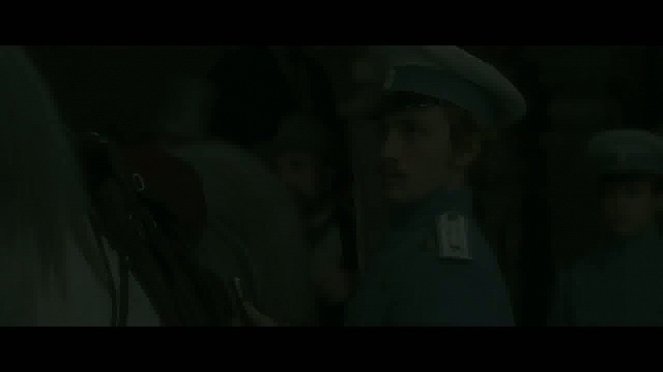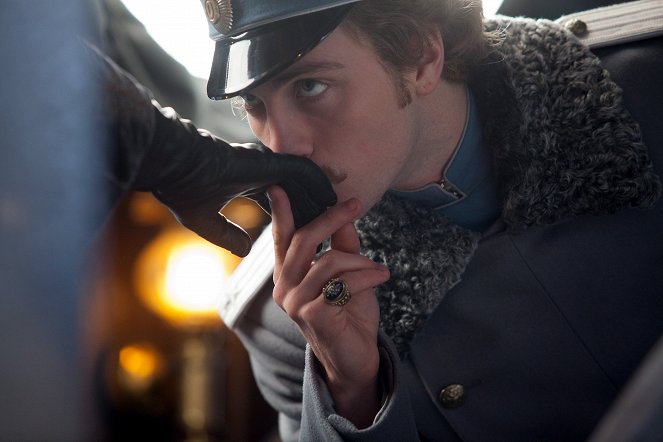Reżyseria:
Joe WrightScenariusz:
Tom StoppardZdjęcia:
Seamus McGarveyMuzyka:
Dario MarianelliObsada:
Keira Knightley, Jude Law, Aaron Taylor-Johnson, Kelly Macdonald, Matthew Macfadyen, Alexandra Roach, Domhnall Gleeson, Alicia Vikander, Emily Watson (więcej)VOD (1)
Opisy(1)
W rozdarciu pomiędzy zaborczym mężem a kochankiem, Anna Karenina próbuje dopasować się wymagań jej rodziny i norm narzucanych przez społeczeństwo. (Viaplay)
Materiały wideo (32)
Recenzje (9)
A beautifully made, pointless thing. Really, even though I can appreciate the way the film is made, in a theatre backstage, this approach doesn’t bring any added value. Actually, I thought it was counterproductive, because the loud unrealism distracted me from the characters, which means that Anna Karenina missed me completely on an emotional level – with the minor exception of sowing hatred towards the protagonist.
()
I really enjoyed seeing Alicia Vikander’s face, as well as Kelly Macdonald's presence and Jude Law's performance. Everything else was pointless. The theater belongs in the theater and Keira can finally stop reigning. I still get the feeling from her that her supposed talent isn't half as pronounced as her eyebrows. On the other hand, I have perhaps never seen such mannerisms from Karenina before. And that's saying something.
()
It didn't work out. Joe Wright once again immersed himself in the waters of a period drama with perfect camera work, captivating Marianelli soundtrack, and the queen Keira, but this time he stumbled. There is no enchantment of Pride and Prejudice or intimate fate of Atonement. Anna loses to me due to uninteresting supporting characters, at times disruptive theatrical form, and most importantly, emotions that I miss most of the time. I admired Vronsky or respected Minister Karenin, but all the loves and sufferings of the main triangle rather cautiously interested me than I surrendered to them. And that is an inevitable disappointment when it comes to Wright adapting classic literature.
()
A melodrama that is afraid to fully submit to its melodramatic nature. By rendering the mise-en-scéne in a theatrical manner, the film’s creators established a perfect alibi in the event that anyone wonders why they would adapt a novel about sincere love and the search for mental balance in our cynical age of virtual relationships. After all, they can defend themselves by pointing out that the whole thing is just theatre of the Russian nobility, an insular world of grand feelings. However, I have no idea how they intend to justify the degree to which this bold stylisation is superficial. The decorations, lighting and camara movements mostly serve the purpose of nonverbally expressing what has already been said in the dialogue. The duplication of information makes the film overly simply and longer than the utilised portion of the book needed to be. Also, it seems that the selection of situations from the book was subordinated to the formalistic aspect. Every pretext for more dynamic movement (dancing, ice-skating, horse races) was employed, some more than once (the unforgettable grain harvest). ___ The action on the surface draws attention away from the peculiar emotional coldness between the characters, especially Ann and Vronsky. Keira’s role suits her, even though she is too young, too slender and her hairstyle and costumes and the spotlights illuminating the stage do most of the acting for her. Aaron Taylor-Johnson, however, was cast completely against the type of the protagonist that he has to portray. No charisma, no body, no respect. His amiable smile evokes the impression of a cub, not a lion of the salons. It’s also his fault that the tension within the intellectual rather than directly amorous triangle doesn’t work, because in his lack of boldness he definitely fails to embody unbridled passion, the opposite of the settled family life from which Anna turns away for little apparent reason. The fundamental weakness of the central romantic relationship, however, lies in the filmmakers’ cluelessness in how they present Anna’s moral lapse in a way that today’s viewers will understand. They don’t want to egg her on, but they don’t want to judge her either. As a result, they show her as being emotionally agitated, not knowing what she actually wants, and consequently heading for ruin. In the book, her motivations and those of the other characters are much clearer, which is in part due to the constant “switching” of points of view, though from today’s perspective they come across as somewhat old-fashioned, which is still better than Wright’s pseudo-modernism. ___ As long as Konstantin Levin’s storyline, which is given priority even over Anna’s storyline in the book, is factored into the film, it deserves to be fleshed out to a greater extent. The quick postscript, aided by the simplest symbolism, comes across as very banal, and the male protagonist, who should have undergone the most complex character transformation, ultimately gives the impression of a well-meaning farmer who has suddenly been enlightened. Despite that, Levin’s relationship with Kitty is more convincing than Anna’s love for Vronsky. This is paradoxically due to the visually simple scenes, when the camerawork settles down and the lovers don’t even have to say anything in order for us to understand what is going on between them. In that moment, the film is actually and honestly about repressed, inexpressible love, and it doesn’t try to excuse its melodramatic nature with a theatrical arrangement. ___ Due to its preoccupation with form, regardless of how breathtaking and reminiscent of the camera dances from Ophüls’s opuses it may be in places, the film unfortunately greatly reduces the intellectual potential of the book, which is sometimes shifted to absolutely inappropriate tones (in the genre of vulgar sex scenes) in an effort to be outwardly impressive. While Tolstoy’s contemplations take the form of trivialised symbols in the film, Anna Karenina is inspiring in its new theatrical “rewrite”. The release of Levin, and briefly Anna, into the more authentic outside world, which involves more than just romantic relationships, essentially casts doubt on the meaningfulness of all sentimental dramas. Though the transitions between the inner and the outer are not handled very imaginatively, I consider the admission that there is something outside of this gleaming melodramatic aquarium to be a very telling sign of the times in which we live. Even in a film about emotional problems, those problems are no longer perceived with the same sense of urgency as they were before. ___ In the end, this Anna Karenina belongs more to Stoppard and Wright than to Tolstoy, and I’m afraid that if the director hadn’t had the foundation of a solid screenplay, he would have played around even more with the visual aspect and would have told even less of the story. All I ask is that next time he doesn’t abuse a book that still has something to say even without the forcefully added visual frills. 75%
()
(mniej)
(więcej)
I have the feeling that after his fantastic debut Joe Wright is looking for something, trying new things, formally experimenting, but he just can’t find it. I experienced deep emotions in Pride and Prejudice and partly in Atonement, but I’ve missed them in his other films. I applaud his courage in treating Tolstoy's old-fashioned novel in the first half as a dynamic, rambunctious piece, situated for much of the runtime in a theatrical setting where sets change in rapid succession and actors present themselves with stylized movements (and it's a joy to watch). But the emotions that shook me so powerfully with the Soviet adaptation of Zarchy are simply not here, they don't surface enough and there are no tears in my eyes. I don't know if this is due to the fact that Zarchy approached Tolstoy's novel with a great deal of respect, perhaps more than that shown by Wright, or if the main stumbling block is that Aaron Taylor-Johnson lacks the manly charisma that makes women's knees buckle. Take away the subtle moustache and you immediately expect Vronsky to hop on a skateboard with his high school classmates and Anna Karenina to be in big trouble with the vice police for seducing an underage youth. The tragic ending itself touched me only very, very slightly and that shouldn't happen in an adaptation of such a fundamental novel. Still, gritting my teeth, I give it a merciful 4*, just for the courage Wright showed, because I’m always in favour of creative experiments.
()



Reklama